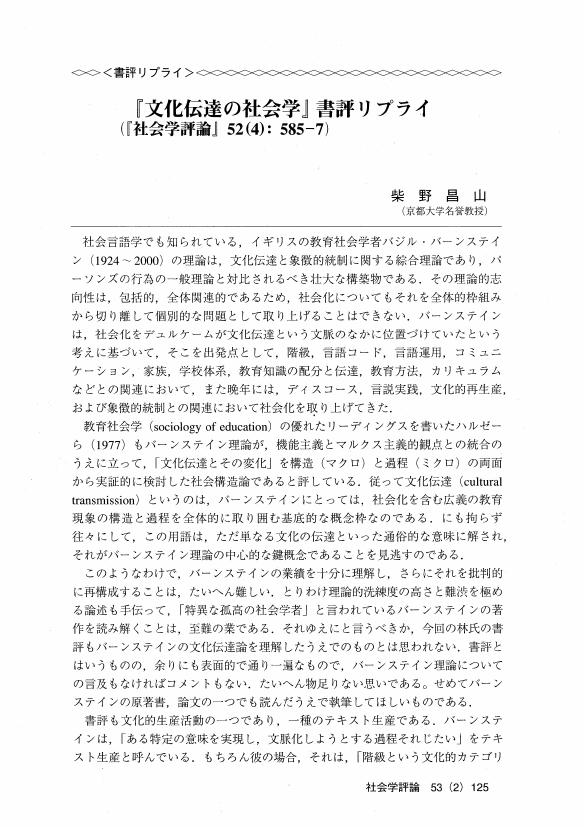2 0 0 0 大学入試改善と大学教育のあり方に関する実証的研究
今年度において特に明らかになった重要な知見として次のようなものがある。1.今日の大学教育のあり方を考える上で、最も重要な論点の一つは、大学教育におけるいわゆる「一般教育」の位置づけにあると思われる。しかし、戦後の大学改革の経過においても「専門教育」と「一般教育」との接続の仕方は未だ十分に改善されているとは言い難く、その結果「一般教育」の必要性すら疑問に付されている。しかし、一方で専門的な学習・研究にとって「一般教育」は依然として不可欠であり、また他面、現在ではむしろ大学が融通の効かない専門家ではなく、「一般教育」を十分に身につけ広い視野をもった人材育成の場となることも各界から望まれているという事実もあり、この点に鑑みれば、「専門教育」の準備段階としてのみならず、それをより高い次元で総合し、広め深めるもっと積極的な意義と位置を「一般教育」に与えることが、今後の大学改革にとって必要な視点と思われる。2.今日の大学のあり方の問題に関わって、企業による新卒学生の選抜過程や、学生生活の実態の調査から次のような新しい観点も提出された。従来大学の機能は専ら専門的な技能や知識の習得にあると考えられてきたが、しかし現実には、大学は各学生の一種の社会化をフォ-マル・インフォ-マルに促進する「かくれた」機能ももっており、この点も明確に考慮にいれた大学の改革が必要である。3.近年社会人の再教育・継続教育の場として大学が注目されているが、大学入試制度の一環たる社会人入学の選抜方法は未だ模索中であると言える。わが国の選抜方法は、諸外国に比べ入学希望者にとって比較的条件の厳しいものであり、この点では更に多様で開かれた選抜方法の可能性が検討される必要がある。
1 0 0 0 OA 知識配分と組織的社会化 「カリキュラムの社会学」を中心に
- 著者
- 柴野 昌山
- 出版者
- 日本教育社会学会
- 雑誌
- 教育社会学研究 (ISSN:03873145)
- 巻号頁・発行日
- vol.37, pp.5-19,en233, 1982-09-20 (Released:2011-03-18)
- 被引用文献数
- 4 2
The author presents a conceptual framework for the analysis of distribution forms of knowledge and “negotiation” processes between teachers and students in the school instead of a “black-box” view of schooling.The analysis based on the interpretative paradigm has several implications for the direction along which researchers should proceed. First, educational knowledge is, as B. Bernstein says, a major regulator of the structure of schooling experiences. Second, the hidden curriculum determines the mode of the transmission of educational knowledge and the forms of knowledge by which students are socialized in terms of the legitimation of symbolic control. Third, major implication of this idea is that this framework would give us a possibility of articulating micro- and macro-levels of analysis, if researchers concerned with sociology of schooling pay more attention to the organizational socialization processes regulated by the hidden curriculum, despite the relative lack of empirical studies under existing circumstances.
- 著者
- 柴野 昌山
- 出版者
- 東洋館
- 雑誌
- 教育社会学研究 (ISSN:03873145)
- 巻号頁・発行日
- no.37, pp.p5-19, 1982-09
The author presents a conceptual framework for the analysis of distribution forms of knowledge and "negotiation" processes between teachers and students in the school instead of a "black-box" view of schooling. The analysis based on the interpretative paradigm has several implications for the direction along which researchers should proceed. First, educational knowledge is, as B. Bernstein says, a major regulator of the structure of schooling experiences. Second, the hidden curriculum determines the mode of the transmission of educational knowledge and the forms of knowledge by which students are socialized in terms of the legitimation of symbolic control. Third, major implication of this idea is that this framework would give us a possibility of articulating micro- and macro-levels of analysis, if researchers concerned with sociology of schooling pay more attention to the organizational socialization processes regulated by the hidden curriculum, despite the relative lack of empirical studies under existing circumstances.
1 0 0 0 OA 『文化伝達の社会学』書評リプライ
- 著者
- 柴野 昌山
- 出版者
- 日本社会学会
- 雑誌
- 社会学評論 (ISSN:00215414)
- 巻号頁・発行日
- vol.53, no.2, pp.125-127, 2002-09-30 (Released:2009-10-19)
